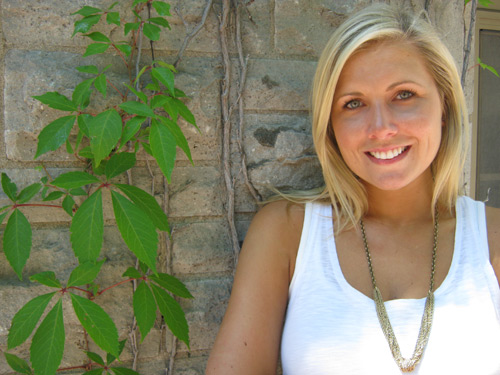
Amy Muise is a hit at cocktail parties.
The moment she introduces herself to someone as a sexuality researcher, word quickly spreads and people start lining up to ask her questions about their sex life and relationships.
“I think people like the fact that I am comfortable with these topics so they know they can ask me anything,” says the PhD student.
The Burlington native is in her third year of study, and her research, which focuses on the social effects of new media on topics related to sexuality and relationships, has not gone unnoticed. Not only is she a highly sought after party guest, but she is also well-known in the media world.
Muise was first thrown into the media spotlight in February 2009 after the release of a study she conducted showing Facebook creates jealousy and suspicion in sexual relationships. This research was the first to provide evidence of a link between Facebook use and jealousy and appeared in headlines around the globe.
“Media interviews were all we did for two weeks after the study was released,” says Muise, who worked on the paper with student colleague Emily Christofides and psychology professor Serge Desmarais. “We were contacted by people from all over the world, including Mexico, the Netherlands and Germany. People would send me the stories they published on our research, but I couldn’t read half of them because they were in a different language.”
Since then, researchers in other parts of the world are replicating their study and applying it to social network systems in their own countries, she adds.
The idea for the study was sparked when Muise and Christofides overheard undergraduate students talking about how jealous their partners would get when they found out the students were interacting with previous romantic or sexual partners via the social networking site.
“We immediately knew this would be a great research project and had to act fast before someone else did it,” says Muise.
She has developed other research projects by chatting with friends, colleagues and students about topics ranging from women who write sexual blogs to motivating factors behind consumers who purchase anti-aging cream.
Her latest research project was actually spurred from a news story in Maclean’s magazine about the growing trend of women participating in erotic photography. Muise interviewed women who had erotic photographs taken of themselves as well as photographers who take erotic photos. The goal of the research was to investigate women’s motivations and reactions to their own erotic photographs.
She found the women viewed the experience as having positive implications, such as increased body esteem and feelings of empowerment. It also gave the women the ability to see themselves as sexual and the opportunity to create a sexual image in a photograph on their own terms.
“I really enjoyed doing this study because it involved in-depth interviews with the women,” says Muise. “My favourite part about being a sexuality researcher is that I am able to give people permission to talk about the things they wouldn’t normally talk about.”
In addition to her research, Muise is also teaching. She instructs the Couple and Family Dynamics course at the University of Guelph-Humber and will be helping to run the course Ethics and Professional Issues in Psychology at Guelph-Humber this fall.